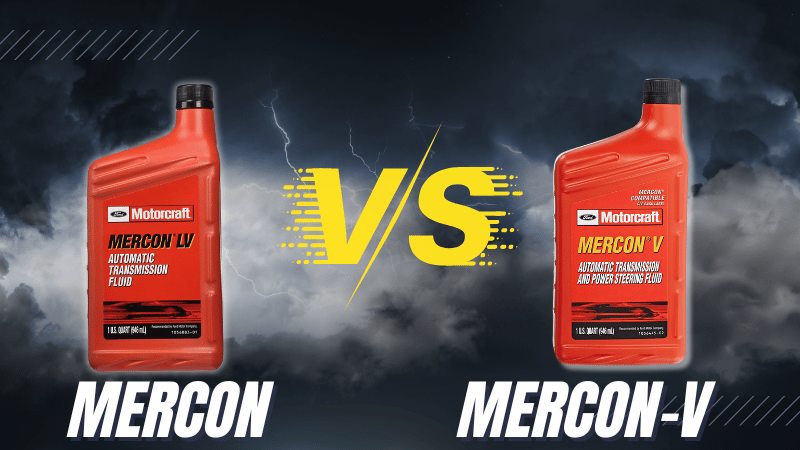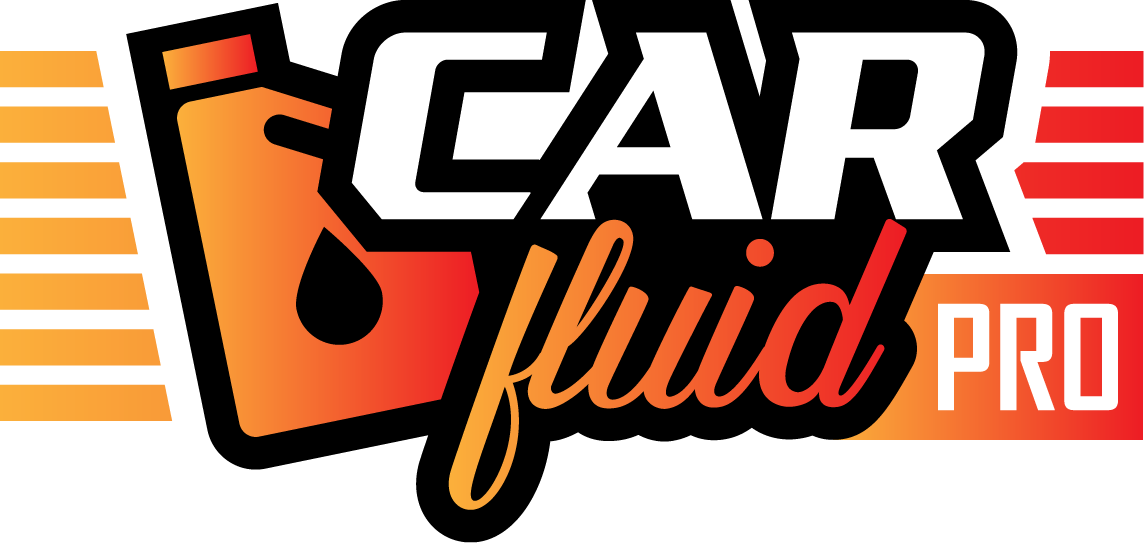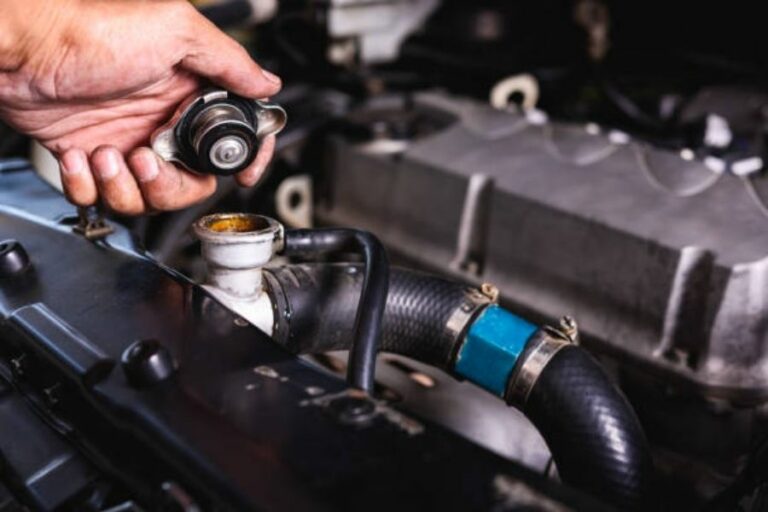Mercon Vs Mercon V: What’s The Best Transmission Fluid?
Mercon fluids vary in consistency; thus, selecting an automatic transmission fluid (ATF) is challenging. Don’t be careless. When you use an incompatible transmission fluid on your Ford engine, you may have irreversible damage.
Mercon oils series are exclusively formulated for Ford engines. Hence, if you own a Ford, Mercon can take care of your vehicle’s engine without a second thought. Which is your best option between Mercon Vs Mercon V? Shortly, since the Mercon original will no longer be in production, Mercon V will always have the best performance for Ford engines. Even so, Mercon V’s unique compatibility makes it a renowned transmission fluid.
Does it seem too complicated? Not a problem. In this guide, we will compare those two Mercon and Mercon V transmission fluids in detail.

Mercon Vs Mercon V: Briefly Comparison Chart
A vehicle’s fluid should be chosen carefully. Without this, you may experience problems like erratic shifting and wear on your car, which affect its performance. Which is better, Mercon or Mercon V? Here are a few highlights.
| Mercon | Mercon V |
| Moderate viscosity | Higher viscosity |
| Suitable for older Ford models | Suitable for almost all Ford models as well as for power steering |
| Prevents corrosion and rust on the engine | The engine is protected from wear and tear by the seal |
| Suitable for Type CJ and Type H fluid models | Fluid compatibility with Dexron III, Type H, and Type C transmission fluids |
| Improves engine performance by lubricating engine parts | Under low temperatures, it prevents corrosion & delivers fast shifting performance |
| Low-temperature shifting occurs rapidly | Continually transmitting fluid at high temperatures without breaking |
| An anti-shudder system ensures engine cleanliness and longevity | Exceptional thermal resistance, sludge resistance, and oxidative stability |
Mercon Vs Mercon V: In-Depth Comparison
Ford Motor Company introduced Mercon as a trademarked product in 1987. Similar to Dexron II, Mercon is also called Mercon II. Yet, the company stopped licensing Mercon’s original version in 2007 in favor of the newer, more powerful Mercon V. Would you like to learn more? Keep scrolling.
About Mercon
Mercon is a brand name for Ford’s technical specifications for automatic transmission fluid. In addition to being registered as a trademark, the name was later used by Ford as a brand. The Ford name & specifications are licensed to companies that produce and sell the fluid as their own brands.
At substantial savings, Mercon automatic transmission fluid can be purchased in bulk if needed. Mercon gear oils and other lubricants were later released by Ford under this brand name.
About Mercon V
Mercon V is also an automatic transmission fluid, commonly known as ATF. In 2007 Ford recommended replacing Mercon ATF with Mercon V within their vehicles. Nevertheless, Mercon V contains a similar mixture to Dexron III. Additionally, if you are unable to purchase Mercon V, Dexron III will not cause any problems.
In addition to Ford Motor Company’s formulation of Mercon V oil, the company also recommends applying this oil to Lincoln, Mercury, and Ford models as well. However, Type F fluid cannot be replaced with this product.
Viscosity
When comparing Mercon Vs Mercon V, users will tend to prefer Mercon V because of its higher viscosity & thinner density. There are more additives in Mercon V than in Mercon. Having been updated from the original Mercon, the viscosity index has been increased. The product works better in colder climates due to its stable consistency that prevents friction & abrasion.
If you are a Mercon user, switching to Merc/Dex ATFs is another option. This is a completely compatible replacement for the previous Mercon.
Amount Of Density
The density of the oil determines how thick it is. Although Mercon & Mercon V are made by the same company, their density differs slightly. Compared to older Mercon, Mercon V has a slightly thicker consistency. Nevertheless, it varies depending on the temperature. Actually, Mercon V thickens when exposed to high temperatures.
Due to its thinner density (7.19), Mercon V is better at preventing abrasion and external and internal friction.
Capabilities
Generally, Mercon is compatible with all older Ford models, whereas Mercon V will be compatible with all the newest Ford models. Furthermore, the chemical formula and additives of Mercon V are similar to those of Dexron III. In contrast to Mercon, Mercon V can also be used to replace Type H and Type CJ fluids.
Ford has improved the Mercon technology throughout the years; however, modern fluids may not always be interchangeable with older fluids. However, neither of the ATFs is compatible using Type F fluid, a popular fluid from the 1970s to 1980s. Being a Ford ATF designed for vintage Ford models, Mercon ATFs cannot be used with it.
User-Friendliness
Are you wondering what Mercon oil is used for? There are many Ford, Lincoln & Mercury vehicles as well as medium- and heavy-duty trucks that can be filled with Mercon (except those requiring Mercon LV, Mercon SP, Mercon ULV & Mercon Type F fluids). GM vehicles and many imported vehicles from before 2006 are also included.
Therefore, Ford Motor Company recommends Mercon V as one of the best transmission oils on the market. In addition, Mercon V oil works effectively on Lincoln, Mercury, and Ford vehicles. Basically, all of these vehicles benefit from transmission fluids made with Mercon V.
Performance
Mercon transmission fluids are the best on the market for overall performance. The transmission is equipped with exceptional anti-shudder technology, ensuring smooth shifting. Thus, it keeps the engine clean for a long time by preventing sticky mud build-up as well as the rush build-up.
Due to its long lifespan and a few other advantages, Mercon was rendered obsolete. It doesn’t matter how many additives any oil contains. If it doesn’t deliver satisfactory performance, there won’t be a second chance.
Mercon V oil also provides exceptional performance in electronic-controlled automatic transmissions. Mercon V is formulated with an ultrahigh viscosity index, hydroprocessing, premium-quality base oils, plus specially formulated performance additives. They have excellent shifting properties at both low and high ambient temperatures, superior thermal stability, and good fluidity at low temperatures.
Besides providing wear protection, it prevents gum, lacquer, sludge, and foam from forming. Additionally, Mercon V protects against corrosion and rust.
Experts Note
- For older vehicles that need transmission fluid changes, it’s important to check which fluid they need.
- Whenever Mercon was originally used, Mercon V can be used instead without any problems.
- With Mercon V, you’ll have a fluid that’s fully synthetic, so it’ll last longer.
- Using Mercon V instead of Mercon increases the time spent changing fluids while also preventing corrosion, rust, and buildup.
- Throughout the lifetime of your automobile, you’ll save money, time, and hassle.
Mercon Vs Mercon V: Which One Is Better?
What’s best between Mercon Vs Mercon V? In general, both Mercon and Mercon V provide great overall performance in transmission fluids. There are differences in their viscosities, performances, and densities. Because Mercon is no longer available on the market, you must select Mercon or Mercon V.
With Mercon V, you can enjoy smooth shifting thanks to outstanding anti-shudder functionality. Thus, the engine stays fully clean for longer by preventing sticky mud & rush buildup. You should choose your transmission fluid by considering your vehicle’s type and personal needs.
FAQs.
Mercon V and Mercon can be mixed?
Based on Ford’s manual, Mercon is not fully compatible with Mercon V. The Mercon V is an improved and upgraded edition of Mercon. As a result, all Ford vehicles requiring Mercon ATF transmissions are compatible with Mercon V. However, mixing these 2 oils is not advised. The best way to use Mercon transmission fluid is to completely flush out the Mercon fluid.
Can I replace Mercon with Mercon V?
Mercon ATF is now accepted to service all transmissions recommended to use Mercon V, explained Ron Romano, FCSD’s Technical Expert in Service Lubricants. The Mercon V specification is tighter, delivering better antioxidation, antiwear, and anti-shudder performance.
What are the special features of Mercon V?
The Mercon V oil is manufactured using ultra-high viscosity, hydro-processed oils, and premium quality, along with specially formulated performance additives. Despite this, the special oil provides excellent shifting performance at both low and high ambient temperatures, as well as good thermal & oxidation resistance.
What is the compatibility of Mercon V?
Several other transmission fluids are compatible with Mercon V. For example, Ford models, Dexron 111 fluids, type H & type CJ fluids work exceptionally well in Mercon V. Sadly, Mercon V cannot be replaced with type F.
Final Thoughts
Mercon Vs Mercon V: which performs best for your car? They are both made for specific purposes and have unique characteristics. Thus, they are equal in every way and excel at what they’re responsible for. Choosing one that meets all your needs is key.
As a synthetic transmission fluid, Mercon V lasts longer & can reduce the frequency of changing transmission fluid. The Mercon V fluid for automatic transmissions is designed specifically for passenger vehicles & light trucks.
Hopefully, you now have a clear understanding of both oils. Also, you know what two types of lubricants are & which one works best for your engine. Take your pick and have fun on a fast ride!




![Allison 1000 Transmission Fluid Type And Capacity [An Absolute Know-All!]](https://carfluidpro.com/wp-content/uploads/Allison-1000-Transmission-Fluid-Type-768x512.jpg)

